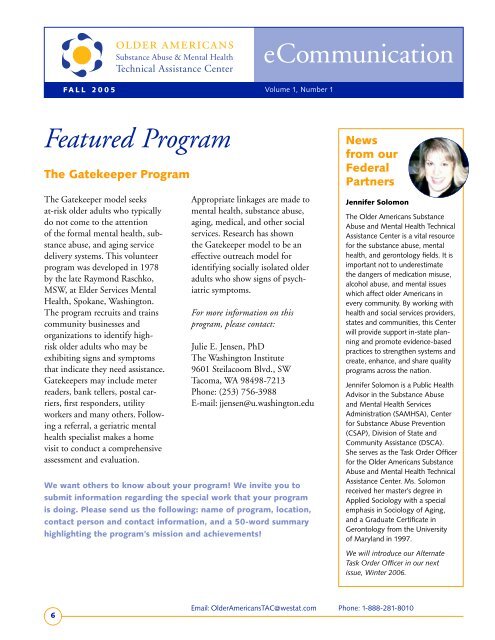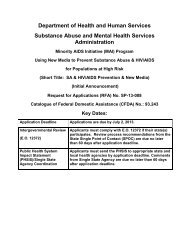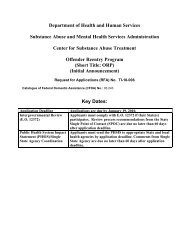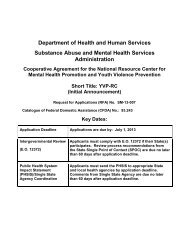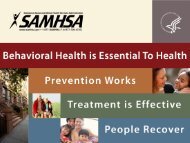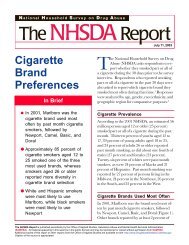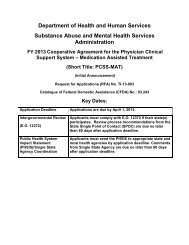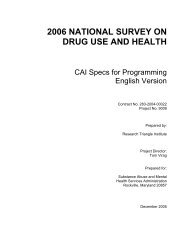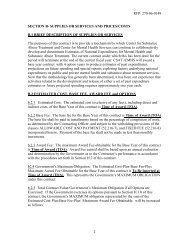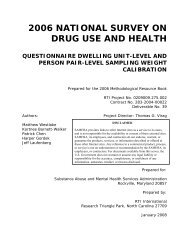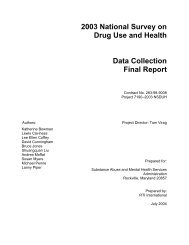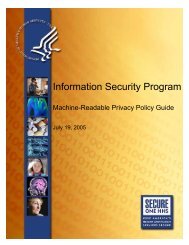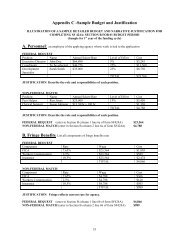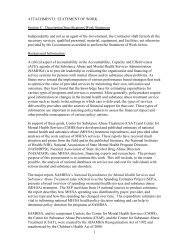eCommunication Fall 2005 - Substance Abuse and Mental Health ...
eCommunication Fall 2005 - Substance Abuse and Mental Health ...
eCommunication Fall 2005 - Substance Abuse and Mental Health ...
You also want an ePaper? Increase the reach of your titles
YUMPU automatically turns print PDFs into web optimized ePapers that Google loves.
FALL <strong>2005</strong><br />
older americans<br />
<strong>Substance</strong> <strong>Abuse</strong> & <strong>Mental</strong> <strong>Health</strong><br />
Technical Assistance Center<br />
<strong>eCommunication</strong><br />
Volume 1, Number 1<br />
Featured Program<br />
The Gatekeeper Program<br />
The Gatekeeper model seeks<br />
at-risk older adults who typically<br />
do not come to the attention<br />
of the formal mental health, substance<br />
abuse, <strong>and</strong> aging service<br />
delivery systems. This volunteer<br />
program was developed in 1978<br />
by the late Raymond Raschko,<br />
MSW, at Elder Services <strong>Mental</strong><br />
<strong>Health</strong>, Spokane, Washington.<br />
The program recruits <strong>and</strong> trains<br />
community businesses <strong>and</strong><br />
organizations to identify highrisk<br />
older adults who may be<br />
exhibiting signs <strong>and</strong> symptoms<br />
that indicate they need assistance.<br />
Gatekeepers may include meter<br />
readers, bank tellers, postal carriers,<br />
first responders, utility<br />
workers <strong>and</strong> many others. Following<br />
a referral, a geriatric mental<br />
health specialist makes a home<br />
visit to conduct a comprehensive<br />
assessment <strong>and</strong> evaluation.<br />
Appropriate linkages are made to<br />
mental health, substance abuse,<br />
aging, medical, <strong>and</strong> other social<br />
services. Research has shown<br />
the Gatekeeper model to be an<br />
effective outreach model for<br />
identifying socially isolated older<br />
adults who show signs of psychiatric<br />
symptoms.<br />
For more information on this<br />
program, please contact:<br />
Julie E. Jensen, PhD<br />
The Washington Institute<br />
9601 Steilacoom Blvd., SW<br />
Tacoma, WA 98498-7213<br />
Phone: (253) 756-3988<br />
E-mail: jjensen@u.washington.edu<br />
We want others to know about your program! We invite you to<br />
submit information regarding the special work that your program<br />
is doing. Please send us the following: name of program, location,<br />
contact person <strong>and</strong> contact information, <strong>and</strong> a 50-word summary<br />
highlighting the program’s mission <strong>and</strong> achievements!<br />
News<br />
from our<br />
Federal<br />
Partners<br />
Jennifer Solomon<br />
The Older Americans <strong>Substance</strong><br />
<strong>Abuse</strong> <strong>and</strong> <strong>Mental</strong> <strong>Health</strong> Technical<br />
Assistance Center is a vital resource<br />
for the substance abuse, mental<br />
health, <strong>and</strong> gerontology fields. It is<br />
important not to underestimate<br />
the dangers of medication misuse,<br />
alcohol abuse, <strong>and</strong> mental issues<br />
which affect older Americans in<br />
every community. By working with<br />
health <strong>and</strong> social services providers,<br />
states <strong>and</strong> communities, this Center<br />
will provide support in-state planning<br />
<strong>and</strong> promote evidence-based<br />
practices to strengthen systems <strong>and</strong><br />
create, enhance, <strong>and</strong> share quality<br />
programs across the nation.<br />
Jennifer Solomon is a Public <strong>Health</strong><br />
Advisor in the <strong>Substance</strong> <strong>Abuse</strong><br />
<strong>and</strong> <strong>Mental</strong> <strong>Health</strong> Services<br />
Administration (SAMHSA), Center<br />
for <strong>Substance</strong> <strong>Abuse</strong> Prevention<br />
(CSAP), Division of State <strong>and</strong><br />
Community Assistance (DSCA).<br />
She serves as the Task Order Officer<br />
for the Older Americans <strong>Substance</strong><br />
<strong>Abuse</strong> <strong>and</strong> <strong>Mental</strong> <strong>Health</strong> Technical<br />
Assistance Center. Ms. Solomon<br />
received her master’s degree in<br />
Applied Sociology with a special<br />
emphasis in Sociology of Aging,<br />
<strong>and</strong> a Graduate Certificate in<br />
Gerontology from the University<br />
of Maryl<strong>and</strong> in 1997.<br />
We will introduce our Alternate<br />
Task Order Officer in our next<br />
issue, Winter 2006.<br />
6<br />
Email: OlderAmericansTAC@westat.com Phone: 1-888-281-8010


